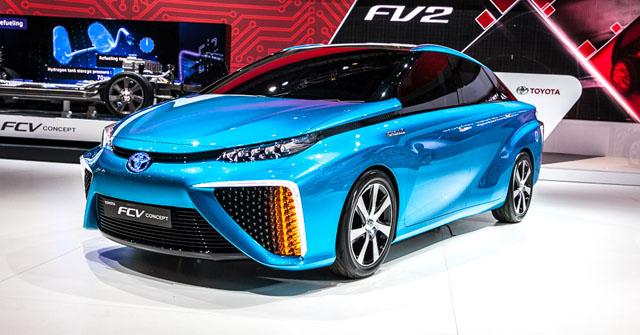You are here
Toyota reveals exterior, price of fuel cell car
By JT - Jun 25,2014 - Last updated at Jun 25,2014

AMMAN — Japanese auto giant Toyota on Wednesday revealed the exterior design and Japan pricing of its hydrogen fuel cell sedan, first unveiled as a concept at the Tokyo Motor Show last year.
The car will launch in Japan before April 2015, the company said in a statement posted on its website, adding that preparations are under way for launches in the US and European markets in the summer of 2015.
In Japan, the fuel cell sedan will go on sale at Toyota and Toyopet dealerships, priced at approximately 7 million yen ($70,000). Initially, sales will be limited to regions where hydrogen refuelling infrastructure is being developed, the company said.
US and Europe prices have not yet been decided.More detailed information, such as specifications, exact prices and sales targets, will be announced later, the company said.
“Toyota’s commitment to environment-friendly vehicles is based on three basic principles: embracing diverse energy sources; developing efficient, low-emission vehicles; and driving real and positive environmental change by popularising these vehicles,” the statement said.
Hydrogen is a particularly promising alternative fuel since it can be produced using a wide variety of primary energy sources, including solar and wind power. When compressed, it has a higher energy density than batteries and is easier to store and transport. In addition to its potential as a fuel for home and automotive use, hydrogen could be used in a wide range of applications, including large-scale power generation, the company said.
Toyota said that it has been developing fuel cell vehicles in-house for more than 20 years. Toyota’s fuel cell system includes a proprietary FC Stack, which generates electricity from the chemical reaction between hydrogen and oxygen, and high-pressure hydrogen tanks. In 2002, Toyota began leasing the “Toyota FCHV”, a fuel cell SUV, on a limited basis in Japan and the US.
Significant improvements have been made to the FC system since 2002. The fuel cell sedan Toyota revealed today, for example, features performance similar to a gasoline engine vehicle, with a cruising range of approximately 700km (according to Toyota measurements taken under the Japanese Ministry of Land, Infrastructure, Transport and Tourism’s JC08 test cycle) and a refueling time of roughly three minutes. When driven, it emits only the water vapor produced by the reaction between hydrogen and oxygen.
Fuel cell vehicles contribute to the diversification of automobile fuels, emit no carbon dioxide or environmentally harmful substances during operation, and offer the convenience of gasoline-powered cars, according to the automaker.
Toyota said it believes the fuel cell cars have a great deal of potential, and are ideal environment-friendly vehicles for promoting a sustainable mobility society.
Toyota revealed that its group companies are also engaging in other hydrogen-related initiatives, such as developing and testing fuel cells for use in homes, and developing fuel cell forklifts and fuel cell buses.
Related Articles
In 1997, Toyota caught its competitors by surprise with the revolutionary Prius, the first commercially successful gasoline-electric hybrid car. Now, the Japanese firm is trying to do the same with a technology that seems straight out of science fiction.
PARIS — Hydrogen could potentially power trains, planes, trucks and factories in the future, helping the world rid itself of harmful emissio
New car sales in Europe rose by nearly 6 per cent in 2014, ending a long slump in activity that began in 2007, but analysts warn the sector has not yet turned the corner in the region.

















